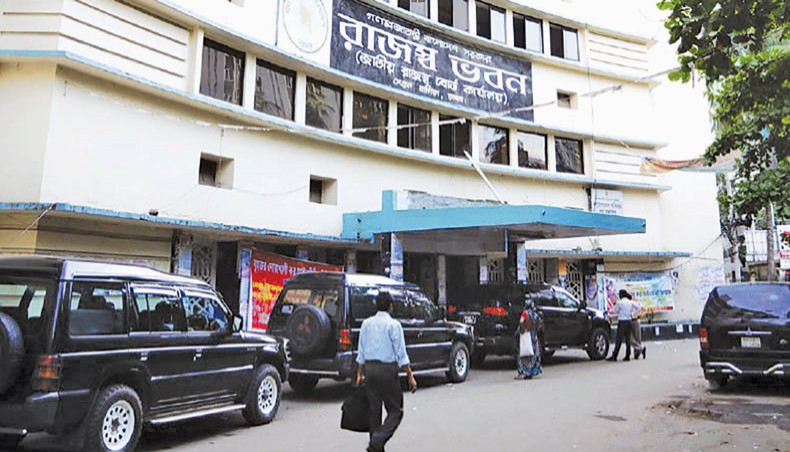A file photo shows the National Board of Revenue headquarters in the capital. The NBR has decided to review all existing statutory regulatory orders, special orders, general orders and explanations related to customs duty and tax and international trade-related procedures to synchronise and make those time befitting. — New Age photo
Feb 28,2020
The National Board of Revenue has decided to review all existing statutory regulatory orders, special orders, general orders and explanations related to customs duty and tax and international trade-related procedures to synchronise and make those time befitting.
The revenue board took the initiative as part of its budget preparations for the upcoming fiscal year of 2020-2021.
Customs wing of the NBR has already formed an eight-member committee to assess the applicability and effectiveness of the SROs, orders and clarifications it issued over the years.
The committee headed by NBR first secretary (customs policy) AKM Nurul Huda Azad will identify inconsistencies, if any, by analysing all effective SROs, orders and clarifications and make specific recommendations to remove the problems.
Officials said that the customs wing had issued hundreds of SROs, orders and explanations since 1972 to facilitate import and export activities, expedite international trade, encourage domestic industrialisation and to boost revenue collection.
In the initial years, the objective of customs SROs was to enhance revenue mobilisation and protection and in the recent years the importance of customs measures has shifted to facilitating trade and ease of doing business.
There might be many SROs, orders and notifications which, when issued, were very relevant for the economy and revenue protection but now has become obsolete due to the changed economic and global trade scenario, they said.
Field-level customs officials also often find that there are a number of redundant SROs, orders or other documents with different instructions and decisions on same issue that causes confusion among them on which one they will follow as all remain effective.
Importers and exporters also face troubles due to the inconsistencies arisen due to the existence of more than one effective SRO or other notifications on the same issue.
There might be many effective SROs through which the government offered duty exemption to the private sector, which are now proved irrelevant.
Even in few years back, the government offered blanket duty exemption facility to many sectors to encourage industrialisation.
Many such sectors have now become obsolete as the nature of the business has completely changed due to introduction of technology, modern equipment and innovations.
Some SROs have now become contradictory to the policy of revenue protection, they said.
A member of the committee on Saturday told New Age that the customs department of the NBR required ensuring synchronisation among the SROs, orders and explanations through removing inconsistencies, scrapping the obsolete ones and merging the redundant gazette notifications into single one to facilitate trade and protect revenue, he said.
The committee will also recommend scrapping the SROs, orders and explanations detrimental to revenue protection, he said, adding that it would also identify the redundant notifications and make suggestions to address the issue.
Currently, the NBR does not have any data on the numbers of such notifications.
The committee in its first meeting held on February 20 decided to compile the data for the review.
The committee will soon submit its report to the revenue board for consideration in the upcoming budget, the committee member said.

